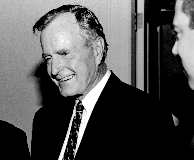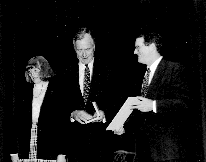
 |
Bush Grateful
Former president warmly |
 On Oct. 3, George Bush stood with German Chancellor Helmut
Kohl in Berlin to celebrate the seventh anniversary of Germany's
reunification. Last Thursday, Bush stood in Shriver Hall on the
Homewood campus to receive the Albert Schweitzer Gold Medal for
Humanitarianism for his role in smoothing the way to that
historic effort.
On Oct. 3, George Bush stood with German Chancellor Helmut
Kohl in Berlin to celebrate the seventh anniversary of Germany's
reunification. Last Thursday, Bush stood in Shriver Hall on the
Homewood campus to receive the Albert Schweitzer Gold Medal for
Humanitarianism for his role in smoothing the way to that
historic effort.The medal was given by the Alexander von Humboldt Foundation, named for the 19th-century explorer and naturalist. The foundation was founded by Alfred Toepfer, a German grain merchant, to support a variety of charitable activities. Johns Hopkins was selected a decade ago to administer the foundation's gold medal award selection process because of its long ties to Germany, dating back to its founding in 1876 on the German model of the graduate-level research university. President William R. Brody chairs the selection board. "Nobody in Germany ever thought we would see in our lifetime the unification of our country," said a moved Lore Toepfer, daughter of the foundation's founder. "My father lived to be 99 years old and was happy that he had lived long enough to see the two Germanys become one again." In addition to the medallion, Toepfer also presented Bush with a page from the Koberger Bible, printed in Germany in 1486. "This page is even older than Columbus' travels to America," she noted.
 Former President George Bush accepted the Albert Schweitzer Gold Medal for Humanitarianism for his role in negotiating the unification of Germany seven years ago. Lori Toepfer (at left) daughter of Alfred Toepfer, who created the foundation that awarded the gold medal, and President Brody made the presentation." In his remarks upon receiving the award, Bush said that as the Cold War was coming to an end, his administration had spent long hours reassuring nations on both sides of the then-crumbling iron curtain that reuniting East and West Germany would be an asset to world peace. "I worked hard," he said, "to convince [Soviet President] Mikhail Gorbachev, and the Poles too, that they had nothing to fear from a united Germany in NATO. I also spent a good deal of time on the phone with the British and French, who likewise had reservations." But, said Bush, the real course of history "was being changed by the people themselves, who had tired of a failed economic system and a political system that had denied them something fundamental: their freedom." The former president was not beyond poking some fun at himself as he accepted the award named for physician Albert Schweitzer. Bush noted that Schweitzer had left a comfortable life in Europe to bring medical care to people in West Africa. "Schweitzer," he said, "would never be accused of lacking the vision thing." He also spoke about the need for an ongoing commitment to service and recognized Volunteers for Medical Engineering, a Baltimore group which helps the disabled live more comfortable and productive lives. Settling into retirement after four years in the White House has called for some adjustments, Bush said. "I'm having an identity crisis. I used to be president ... of the United States," he said pausing for the rising swell of laughter. "Now I'm either the father of the governor of Texas or Barbara's husband." The text of President Brody's comments and Bush's acceptance speech can be found on JHUniverse, at: www.jhu.edu/news_info/news/univ97/oct97/bushtext.html.
Go back to Previous Page
|